小学四年级英语(下册)一般疑问句特殊疑问句
小学英语四种基本句型-肯定句、否定句、一般疑问句与特殊疑问句
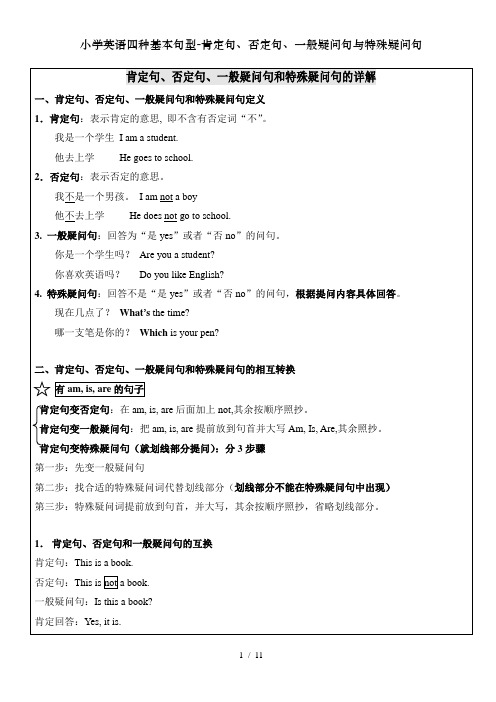
3 / 11
小学英语四种基本句型-肯定句、否定句、一般疑问句与特殊疑问句 特殊:
1.some 变为 any There are some birds in the tree.→There aren't any birds in the tree. 但是,若在表示请邀请、请求的句子中,some 可以不变。 Would you like some orange juice? 与此相关的一些不定代词如 something, somebody 等也要进行相应变化。
2.就划线部分提问(变特殊疑问句) I like English. 第一步:先变一般疑问句 Do you like English? 第二步:找合适的特殊疑问词代替划线部分 Do you like what? 第三步:特殊疑问词提前放到句首,并大写,其余按顺序照抄,省略划线部分。 What do you like?
类别 陈述句
疑问句
用法
标点
肯定 叙述一件事情或 说明说话人的看法 .
否定
一般 用于提出问题
?
特殊 用于提出问题
?
例句 This is a bag. That's my book. I can see a bag over there. I don't know. Are you a student? Do you like puppets? Can you speak English? What's your name? Where's my bag? How many trees are there?
1. 肯定句、否定句和一般疑问句的互换 肯定句:This is a book. 否定句:This is not a book. 一般疑问句:Is this a book? 肯定回答:Yes, it is.
小学英语特殊疑问句和一般疑问句地归纳

特殊疑问句和一般疑问句的答法一般疑问句通常都是 1..以be (am,is,are,)开头2.以Do,Does,Did 开头或以Can开头回答方法:前面用什么提问的就用什么答。
只有两种回答方式:1)肯定的, Yes,主语 + 提问词.2)否定的 No,主语+提问词+not.【注意:问句与答句的第一二人称要互换】如:④主语是名字时的答语:看性别,男的用he ,女的用she ,其他的用it 复数就用they。
如:①Is she……? Is he………? Is it……..?Yes, she is. Yes, he is. Yes, it is.No, she isn,t. No, he isn,t. No, it isn,t.②Are they………? Are the monkeys …….?Yes, they are. Yes, they are.No,they aren’t No,they aren’t③ Do they………? Does he……..? Did she…….?Yes,they do. Yes,he does. Yes, she did.No,they don’t. No,he doesn’t. No,she didn’t.④Are you……..? Are you……..? Do you…….?Yes, I am. Yes, we are. Yes ,I do. 或 Yes,No, I am not. No, we aren’t. No,I don’t. 或No,⑤Does Mike…….? Is ChenJi…..? Do your parents…?Yes ,he does. Yes , she is. Yes, they do.No,he doesn’t. No, she isn’t. No,they don’t.一、专项练习。
1. Did ChenJie read books yesterday?2. Can the girl cook the meals ?—————————————————————————————3.Is he going to swim this afternoon?4. Are they going to take a trip next weend? ————————————————————————————————5.Does he often go to school by bike ? 6. Do you play basketball every weekend? ———————————————————————————————————7. Did Mike do his homework yesterday? 8. Are they playing basketball now?————————————————————————————————一般疑问句及特殊疑问句的总结一般疑问句的定义:用yes或no来回答的疑问句叫一般疑问句。
一般疑问句、特殊疑问句、选择疑问句、反义疑问句地详细用法
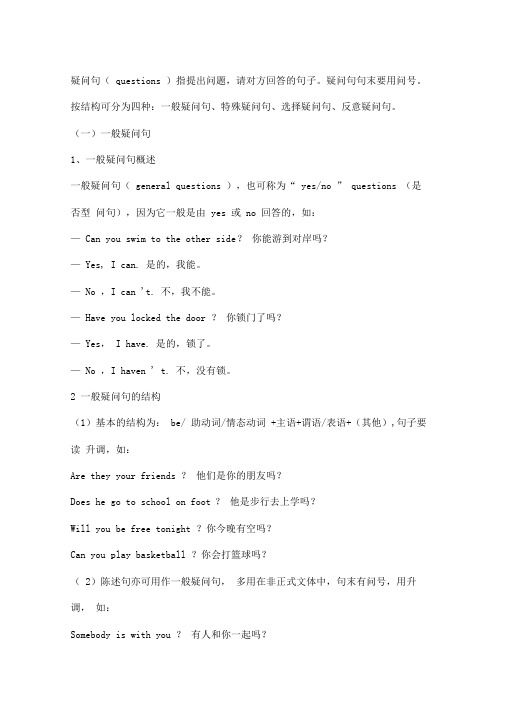
疑问句( questions )指提出问题,请对方回答的句子。
疑问句句末要用问号。
按结构可分为四种:一般疑问句、特殊疑问句、选择疑问句、反意疑问句。
(一)一般疑问句1、一般疑问句概述一般疑问句( general questions ),也可称为“ yes/no ” questions (是否型问句),因为它一般是由 yes 或 no 回答的,如:— Can you swim to the other side ?你能游到对岸吗?— Yes, I can. 是的,我能。
— No ,I can 't. 不,我不能。
— Have you locked the door ?你锁门了吗?— Yes, I have. 是的,锁了。
— No ,I haven ' t. 不,没有锁。
2 一般疑问句的结构(1)基本的结构为: be/ 助动词/情态动词 +主语+谓语/表语+(其他),句子要读升调,如:Are they your friends ?他们是你的朋友吗?Does he go to school on foot ?他是步行去上学吗?Will you be free tonight ?你今晚有空吗?Can you play basketball ?你会打篮球吗?( 2)陈述句亦可用作一般疑问句,多用在非正式文体中,句末有问号,用升调,如:Somebody is with you ?有人和你一起吗?He didn ' t finish the work ?他没有做完活吗?You are fresh from America , I suppose ?我猜,你刚从美国回来吧?3、一般疑问句的答语( 1)一般疑问句一般由 yes 或 no 来回答,如:— Are you tired ?你累了吗?— Yes,I am. 是的 ,累了。
— No, I ' m not. 不,不累。
— Does she do the cleaning ?她扫除了吗?— Yes , she does. 是的,她打扫了。
小学英语特殊疑问句和一般疑问句的归纳

特殊疑问句和一般疑问句的答法一般疑问句通常都是1..以be (am,is,are,)开头2.以Do,Does,Did 开头或以Can开头回答方法:前面用什么提问的就用什么答。
只有两种回答方式:1)肯定的,Yes,主语+ 提问词.2)否定的No,主语+提问词+not.【注意:问句与答句的第一二人称要互换】如:④主语是名字时的答语:看性别,男的用he ,女的用she ,其他的用it 复数就用they。
如:①Is she……? Is he………? Is it……..?Yes, she is.Yes, he is. Yes, it is.No, she isn,t. No, he isn,t. No, it isn,t.②Are they………? Are the monkeys …….?Yes, they are.Yes, they are.No,they aren’t No,they aren’t③Do they………?Does he……..? Did she…….?Yes,they do. Yes,he does. Yes, she did.No,they don’t. No,he doesn’t. No,she didn’t.④Are you……..?Are you……..? Do you…….?Yes, I am.Yes, we are. Yes ,I do. 或Yes,No, I am not. No, we aren’t. No,I don’t. 或No,⑤Does Mike…….? Is ChenJi…..? Do your parents…?Yes ,he does.Yes , she is. Yes, they do.No,he doesn’t. No, she isn’t. No,they don’t.一、专项练习。
1. Did ChenJie read books yesterday?2. Can the girl cook the meals ?—————————————————————————————3.Is he going to swim this afternoon?4. Are they going to take a trip next weend? ————————————————————————————————5.Does he often go to school by bike ? 6. Do you play basketball every weekend? ———————————————————————————————————7. Did Mike do his homework yesterday? 8. Are they playing basketball now?————————————————————————————————一般疑问句及特殊疑问句的总结一般疑问句的定义:用yes或no来回答的疑问句叫一般疑问句。
小学英语特殊疑问句和一般疑问句的归纳

特殊疑问句和一般疑问句的答法一般疑问句通常都是 1..以be (am,is,are,)开头2.以Do,Does,Did 开头或以Can开头回答方法:前面用什么提问的就用什么答。
只有两种回答方式:1)肯定的, Yes,主语 + 提问词.2)否定的 No,主语+提问词+not.【注意:问句与答句的第一二人称要互换】如:④主语是名字时的答语:看性别,男的用he ,女的用she ,其他的用it 复数就用they。
如:①Is she…… Is he……… Is it……..Yes, she is. Yes, he is. Yes, it is.No, she isn,t. No, he isn,t. No, it isn,t.②Are they……… Are the monkeys …….Yes, they are. Yes, they are.No,they aren’t No,they aren’t③ Do they……… Does he…….. Did she…….Yes,they do. Yes,he does. Yes, she did.No,they don’t. No,he doesn’t. No,she didn’t.④Are you…….. Are you…….. Do you…….Yes, I am. Yes, we are. Yes ,I do. 或 Yes,No, I am not. No, we aren’t. No,I don’t. 或No,⑤Does Mike……. Is ChenJi….. Do your parents…Yes ,he does. Yes , she is. Yes, they do.No,he doesn’t. No, she isn’t. No,they don’t.111v1.0 可编辑可修改一、专项练习。
1. Did ChenJie read books yesterday2. Can the girl cook the meals—————————————————————————————he going to swim this afternoon 4. Are they going to take a trip next weekend ————————————————————————————————5.Does he often go to school by bike 6. Do you play basketball every weekend ———————————————————————————————————7. Did Mike do his homework yesterday 8. Are they playing basketball now————————————————————————————————一般疑问句及特殊疑问句的总结一般疑问句的定义:用yes或no来回答的疑问句叫一般疑问句。
最新PEP小学四年级英语下册一般疑问句和特殊疑问句知识精讲
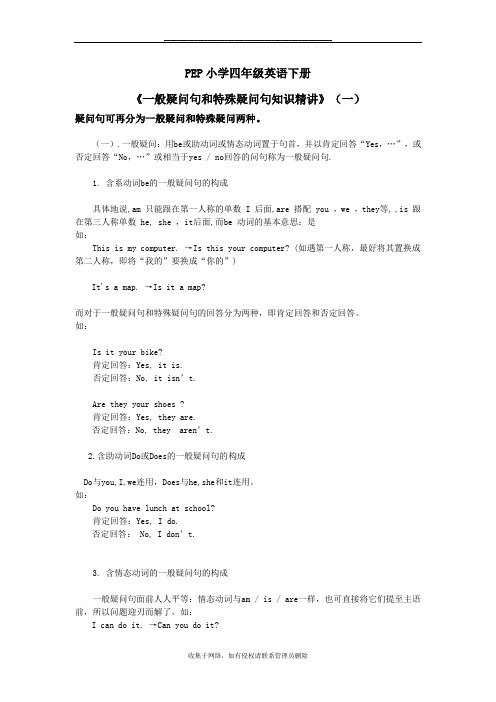
PEP小学四年级英语下册《一般疑问句和特殊疑问句知识精讲》(一)疑问句可再分为一般疑问和特殊疑问两种。
(一).一般疑问:用be或助动词或情态动词置于句首,并以肯定回答“Yes,…”,或否定回答“No,…”或相当于yes / no回答的问句称为一般疑问句.1. 含系动词be的一般疑问句的构成具体地说,am 只能跟在第一人称的单数 I 后面,are 搭配 you ,we ,they等, ,is 跟在第三人称单数 he, she ,it后面,而be 动词的基本意思:是如:This is my computer. →Is this your computer? (如遇第一人称,最好将其置换成第二人称,即将“我的”要换成“你的”)It's a map. →Is it a map?而对于一般疑问句和特殊疑问句的回答分为两种,即肯定回答和否定回答。
如:Is it your bike?肯定回答:Yes, it is.否定回答:No, it isn’t.Are they your shoes ?肯定回答:Yes, they are.否定回答:No, they are n’t.2.含助动词Do或Does的一般疑问句的构成Do与you,I,we连用,Does与he,she和it连用。
如:Do you have lunch at school?肯定回答:Yes, I do.否定回答:No, I don’t.3. 含情态动词的一般疑问句的构成一般疑问句面前人人平等:情态动词与am / is / are一样,也可直接将它们提至主语前,所以问题迎刃而解了。
如:I can do it. →Can you do it?肯定回答:Yes,I can.否定回答:No, I can’t.(记住在改成一般疑问句时应该将第一人称改成第二人称)Can I wear my new shirt today?肯定回答:Yes,you can.否定回答:No, you can’t.4. 小插曲:一般疑问句的语调大部分的一般疑问句都应读作升调(↗),并落在最后一个单词身上。
小学英语四种基本句型肯定句、否定句、一般疑问句与特殊疑问句

shoes? 表示物:They are white sheep. What are they?
表示颜色:They are white sheep. What color are these
sheep? 5、 名词所有格和人
表示名词所有格:She’s Lucy’s sister. Whose sister is
小学英语四种基本句型-肯定 句、否定句、一般疑问句与特殊 疑问句
肯定句、否定句、一般疑问句和特殊疑问句的详解
一、肯定句、否定句、一般疑问句和特殊疑问句定义 1.肯定句:表示肯定的意思, 即不含有否定词“不”。
我是一个学生 I am a student. 他去上学 He goes to school. 2.否定句:表示否定的意思。 我不是一个男孩。 I am not a boy 他不去上学 He does not go to school. 3. 一般疑问句:回答为“是 yes”或者“否 no”的问句。 你是一个学生吗? Are you a student? 你喜欢英语吗? Do you like English? 4. 特殊疑问句:回答不是“是 yes”或者“否 no”的问句,根据提问内容具体回答。 现在几点了? What’s the time? 哪一支笔是你的? Which is your pen?
2.就划线部分提问(变特殊疑问句)
I like English. 第一步:先变一般疑问句 Do you like English?
第二步:找合适的特殊疑问词代替划线部分 Do you like what?
第三步:特殊疑问词提前放到句首,并大写,其余按顺序照抄,省略划线部分。
What do you like?
没有 am, is, are 的句子 肯定句变否定句:在主语后面加上 do not 或者 does not,其余按顺序照抄动词用原形 肯定句变一般疑问句:在句首加 do 或者 does 并大写,其余照抄。注意:动词用原形 肯定句变特殊疑问句(就划线部分提问):分 3 步骤 第一步:先变一般疑问句 第二步:找合适的特殊疑问词代替划线部分(划线部分不能在特殊疑问句中出现) 第三步:特殊疑问词提前放到句首,并大写,其余按顺序照抄,省略划线部分。
小学英语一般疑问句和特殊疑问句(附练习题)
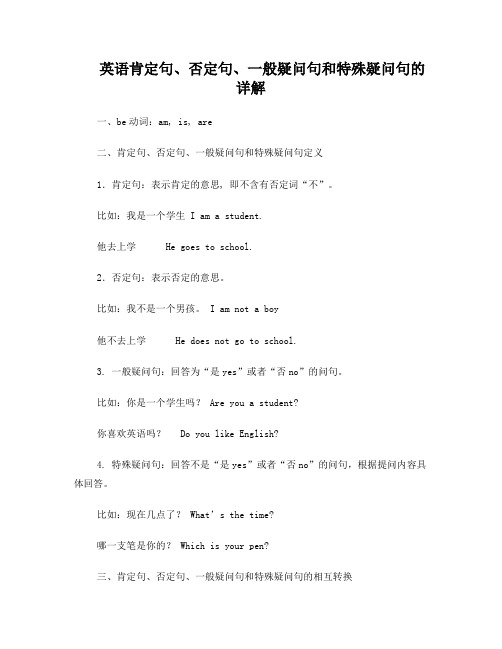
英语肯定句、否定句、一般疑问句和特殊疑问句的详解一、be动词:am, is, are二、肯定句、否定句、一般疑问句和特殊疑问句定义1.肯定句:表示肯定的意思, 即不含有否定词“不”。
比如:我是一个学生 I am a student.他去上学 He goes to school.2.否定句:表示否定的意思。
比如:我不是一个男孩。
I am not a boy他不去上学 He does not go to school.3. 一般疑问句:回答为“是yes”或者“否no”的问句。
比如:你是一个学生吗? Are you a student?你喜欢英语吗? Do you like English?4. 特殊疑问句:回答不是“是yes”或者“否no”的问句,根据提问内容具体回答。
比如:现在几点了?What’s the time?哪一支笔是你的? Which is your pen?三、肯定句、否定句、一般疑问句和特殊疑问句的相互转换有am, is, are的句子,肯定句变否定句:在am, is, are后面加上not,其余按顺序照抄。
肯定句变一般疑问句:把am, is, are提前放到句首并大写Am, Is, Are,其余照抄。
肯定句变特殊疑问句(就划线部分提问):分3步骤第一步:先变一般疑问句第二步:找合适的特殊疑问词代替划线部分第三步:特殊疑问词提前放到句首,并大写,其余按顺序照抄,省略划线部分。
注意:1.一定先变一般疑问句。
但是,如果问的是主语或主语的定语时,语序不变,为"特殊疑问词(+主语)+陈述句"。
如:Li ming 's not here today. Who's not here today? 今天谁没来?2.划线部分不能在特殊疑问句中出现。
when 什么时间(问时间)what date 什么日期问具体日期who 谁(问人)what place什么地点问具体地址whose 谁的问主人how …怎么样问情况where 在哪里问地点how old 多大问年龄which 哪一个问选择how many 多少问数量例如:1.肯定句、否定句和一般疑问句的互换肯定句:This is a book.否定句:This is not a book.一般疑问句:Is this a book?肯定回答:Yes, it is.否定回答:No, it isn’t.2.就划线部分提问(变特殊疑问句)This is a book.第一步:变一般疑问句 Is this a book?第二步:找合适的特殊疑问词 Is this what ?第三步:特殊疑问词提前放到句首,并大写,其余按顺序照抄,省略划线部分。
小学英语特殊疑问句和一般疑问句地归纳
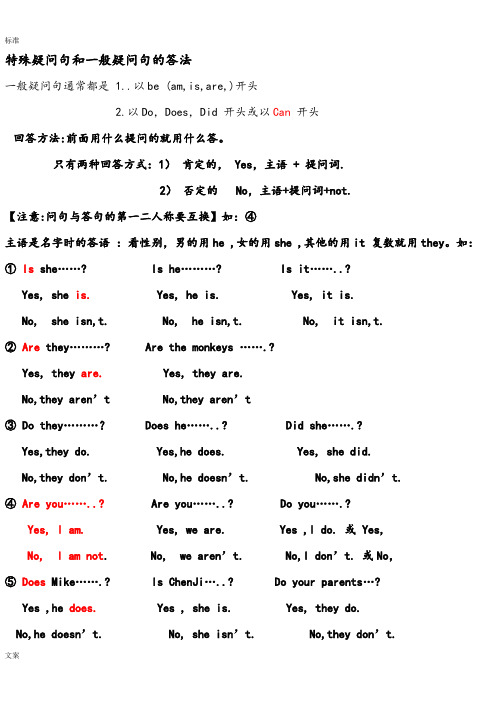
特殊疑问句和一般疑问句的答法一般疑问句通常都是 1..以be (am,is,are,)开头2.以Do,Does,Did 开头或以Can开头回答方法:前面用什么提问的就用什么答。
只有两种回答方式:1)肯定的, Yes,主语 + 提问词.2)否定的 No,主语+提问词+not.【注意:问句与答句的第一二人称要互换】如:④主语是名字时的答语:看性别,男的用he ,女的用she ,其他的用it 复数就用they。
如:①Is she……? Is he………? Is it……..?Yes, she is. Yes, he is. Yes, it is.No, she isn,t. No, he isn,t. No, it isn,t.②Are they………? Are the monkeys …….?Yes, they are. Yes, they are.No,they aren’t No,they aren’t③ Do they………? Does he……..? Did she…….?Yes,they do. Yes,he does. Yes, she did.No,they don’t. No,he doesn’t. No,she didn’t.④Are you……..? Are you……..? Do you…….?Yes, I am. Yes, we are. Yes ,I do. 或 Yes,No, I am not. No, we aren’t. No,I don’t. 或No,⑤Does Mike…….? Is ChenJi…..? Do your parents…?Yes ,he does. Yes , she is. Yes, they do.No,he doesn’t. No, she isn’t. No,they don’t.一、专项练习。
1. Did ChenJie read books yesterday?2. Can the girl cook the meals ?—————————————————————————————3.Is he going to swim this afternoon?4. Are they going to take a trip next weend? ————————————————————————————————5.Does he often go to school by bike ? 6. Do you play basketball every weekend? ———————————————————————————————————7. Did Mike do his homework yesterday? 8. Are they playing basketball now?————————————————————————————————一般疑问句及特殊疑问句的总结一般疑问句的定义:用yes或no来回答的疑问句叫一般疑问句。
小学英语语法详解疑问句--一般疑问句、特殊疑问句
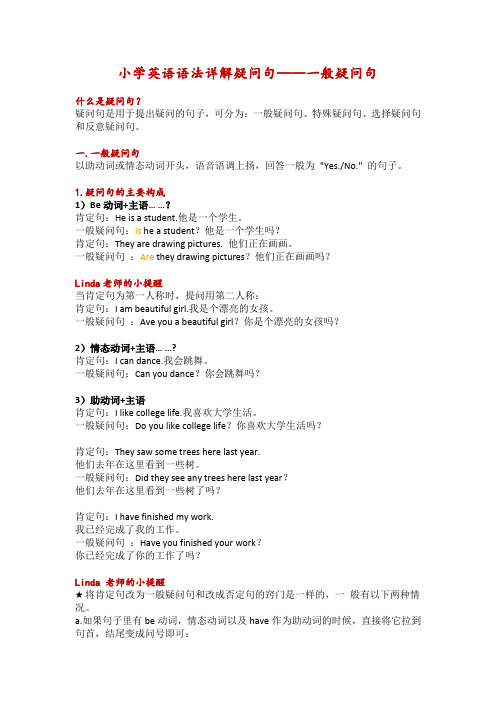
小学英语语法详解疑问句——一般疑问句什么是疑问句?疑问句是用于提出疑问的句子,可分为:一般疑问句、特殊疑问句、选择疑问句和反意疑问句。
一.一般疑问句以助动词或情态动词开头,语音语调上扬,回答一般为"Yes./No." 的句子。
1.疑问句的主要构成1)Be动词+主语… …?肯定句:He is a student.他是一个学生。
一般疑问句:Is he a student?他是一个学生吗?肯定句:They are drawing pictures. 他们正在画画。
一般疑问句:Are they drawing pictures?他们正在画画吗?Linda老师的小提醒当肯定句为第一人称时,提问用第二人称:肯定句:I am beautiful girl.我是个漂亮的女孩。
一般疑问句:Ave you a beautiful girl?你是个漂亮的女孩吗?2)情态动词+主语… …?肯定句:I can dance.我会跳舞。
一般疑问句:Can you dance?你会跳舞吗?3)助动词+主语肯定句:I like college life.我喜欢大学生活。
一般疑问句:Do you like college life?你喜欢大学生活吗?肯定句:They saw some trees here last year.他们去年在这里看到一些树。
一般疑问句:Did they see any trees here last year?他们去年在这里看到一些树了吗?肯定句:I have finished my work.我已经完成了我的工作。
一般疑问句:Have you finished your work?你已经完成了你的工作了吗?Linda 老师的小提醒★将肯定句改为一般疑问句和改成否定句的窍门是一样的,一般有以下两种情况。
a.如果句子里有be动词,情态动词以及have作为助动词的时候,直接将它拉到句首,结尾变成问号即可:He is twelve.→ Is he twelve?She can swim.→ Can she swim?I have got it.→ Have you got it?b.当句子里是实义动词时,我们也可以用一些小窍门:肯定句:I go to the park.我去公园。
一般疑问句、特殊疑问句的构成形式及基本用法
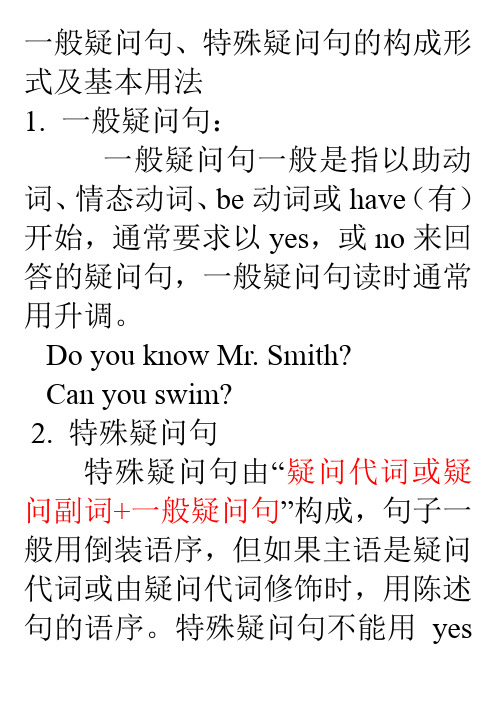
一般疑问句、特殊疑问句的构成形式及基本用法1. 一般疑问句:一般疑问句一般是指以助动词、情态动词、be动词或have(有)开始,通常要求以yes,或no来回答的疑问句,一般疑问句读时通常用升调。
Do you know Mr. Smith?Can you swim?2. 特殊疑问句特殊疑问句由“疑问代词或疑问副词+一般疑问句”构成,句子一般用倒装语序,但如果主语是疑问代词或由疑问代词修饰时,用陈述句的语序。
特殊疑问句不能用yes或no回答,读时用降调。
例如:Who is on duty today?How long have you been in Beijing? What time do you get up every morning?What must I do now?3. 注意疑问词的选择1. 问“谁”用who或whom。
如:Who is a doctor?Li Lei is a doctor.(对主语提问用who,对宾语提问用who,whom均可)2. 问“谁的”用whose。
如:Whose book is this?This is his book.3. 问“地点”用where。
如:Where is the ball?The ball is under the bed.4. 问“原因”用why。
如:Why didn't he come?He didn't come because he was ill.5. 问“身体状况”用how。
如:How are you?I'm fine.6. 问“方式”用how。
如:How did he do it?He did it in that way.7. 问“程度”用“how +被修饰语”。
如:How wide is the river?The river is five metres wide.8. 问“多少”用how much或how many。
四年级-一般疑问句和特殊疑问句

四年级-⼀般疑问句和特殊疑问句⼀般疑问句和特殊疑问句【⼀般疑问句】⼀、什么是⼀般疑问句?答:能⽤yes / no(或相当于yes / no)回答的问句叫⼀般疑问句。
如何将陈述句变为⼀般疑问句1、第⼀家族:含be动词或情态动词的句⼦秘诀:⼀调⼆改三问号⼀调:即把句中的be或情态动词调到主语前;⼆改:改换主语称谓,即将句中的主语I\my \mines\we\our\ours等第⼀⼈称分别改为相应的第⼆⼈称you\your\ yours等;三问号:句末的句号改为问号。
如:. I am an English teacher. → Are you an English teacher?. We can speak English fluently. → Can you speak English fluently?2、第⼆家族:含⾏为动词(或称为实义动词)的句⼦秘诀:⼀加⼆改三问号⼀加:即在句⾸加助动词Do或Does;⼆改:1、把谓语动词改为原形;2、改换主语称谓(同第⼀家组);三问号:句末的句号改为问号。
. We read English every morning. → Do you read English every morning?. Tom’s father listens to English on the radio every evening. →Does Tom’s father listen to English on the radio every evening?特别注意:对于第⼆家族⼀定要注意动词的还原,因为时态与数的变化已经体现在助动词上了。
3、加强记忆⼝诀:“肯变⼀,并不难,can 或be提在前;谓语若为⾏为动,do 或does句⾸⽤。
”六、“some”还是“any”?在⼀般疑问句中,要表达“⼀些”时,⼀般⽤any,但如果这个问句是⽤来表达“建议、请求、邀请”等交际功能时,应该some. Is there any tea in the cup?. Do you have any children?. May I have some fish?Would you like some tea?Shall we buy some vegetables?Can I borrow some money from you?Why not have some bread?How about some orange juice?练练吧⼀、改为⼀般疑问句1. I can skate well. __________ __________skate well?2. Kate does morning exercises every day.________ Kate________ morning exercises every day?3. The exam begins at nine. __________ the exam__________ at nine?4. Ann returned the book to the library yesterday._______ Ann_______ the book to the library yesterday?5. There's something to eat in the cupboard.__________ there__________ to eat in the cupboard?6. Mary likes scuba diving very much._________ Mary_________ scuba diving very much?⼆、⽤ is, are, am ,do, did ,does ,can 填空,然后变成⼀般疑问句1. His father ____an English teacher.2. These children_____ crying.3. They______swim.4. ______ you like reading English? Yes, I like reading English.5. How _____you go to school? I go to school on foot.6. What _____he like? He likes English.7. _____ his father go to work by bus? No, his father rides a bike to work.8. ______ your father read newspaper last night? No, he read a story book.9.I ____ a teacher.⼀般疑问句10. He ____ a doctor.⼀般疑问句11.You _____ good workers.⼀般疑问句12.______ (它是) an apple.⼀般疑问句13.They _____ workers.⼀般疑问句14.I _____ three books.⼀般疑问句He ____ many trees.⼀般疑问句I can speak English.⼀般疑问句They can swim.⼀般疑问句Shall he call you tonight?陈述句I need finish my work.⼀般疑问句【特殊疑问句】特殊疑问句要由疑问代词或疑问副词开头,询问的内容不同, 使⽤的疑问词也不同。
人教版小学四年级英语下册一般疑问句和特殊疑问句知识精讲

人教版小学四年级英语下册一般疑问句和特殊疑问句知识精讲Document serial number【UU89WT-UU98YT-UU8CB-UUUT-UUT108】PEP小学四年级英语下册《一般疑问句和特殊疑问句知识精讲》(一)疑问句可再分为一般疑问和特殊疑问两种。
(一).一般疑问:用be或助动词或情态动词置于句首,并以肯定回答“Yes,…”,或否定回答“No,…”或相当于yes / no回答的问句称为一般疑问句.1. 含系动词be的一般疑问句的构成具体地说,am 只能跟在第一人称的单数 I 后面,are 搭配 you ,we ,they等, ,is 跟在第三人称单数 he, she ,it后面,而be 动词的基本意思:是如:This is my computer. →Is this your computer (如遇第一人称,最好将其置换成第二人称,即将“我的”要换成“你的”) It's a map. →Is it a map而对于一般疑问句和特殊疑问句的回答分为两种,即肯定回答和否定回答。
如:Is it your bike肯定回答:Yes, it is.否定回答:No, it isn’t.Are they your shoes肯定回答:Yes, they are.否定回答:No, they are n’t.2.含助动词Do或Does的一般疑问句的构成Do与you,I,we连用,Does与he,she和it连用。
如:Do you have lunch at school肯定回答:Yes, I do.否定回答:No, I don’t.3. 含情态动词的一般疑问句的构成一般疑问句面前人人平等:情态动词与am / is / are一样,也可直接将它们提至主语前,所以问题迎刃而解了。
如:I can do it. →Can you do it肯定回答:Yes,I can.否定回答:No, I can’t.(记住在改成一般疑问句时应该将第一人称改成第二人称)Can I wear my new shirt today肯定回答:Yes,you can.否定回答:No, you can’t.4. 小插曲:一般疑问句的语调大部分的一般疑问句都应读作升调(↗),并落在最后一个单词身上。
(完整版)小学英语四种基本句型肯定句否定句、一般疑问句与特殊疑问句
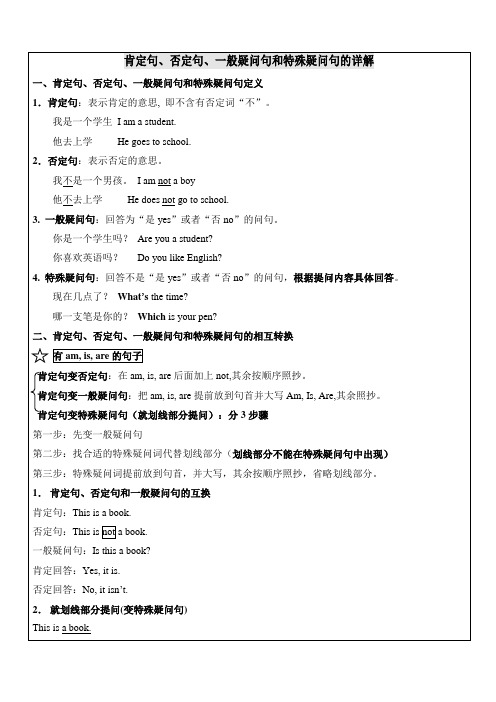
一、肯定句、否定句、一般疑问句和特殊疑问句定义 1.肯定句:表示肯定的意思, 即不含有否定词“不”。
我是一个学生 I am a student. 他去上学 He goes to school. 2.否定句:表示否定的意思。 我不是一个男孩。 I am not a boy 他不去上学 He does not go to school. 3. 一般疑问句:回答为“是 yes”或者“否 no”的问句。 你是一个学生吗? Are you a student? 你喜欢英语吗? Do you like English? 4. 特殊疑问句:回答不是“是 yes”或者“否 no”的问句,根据提问内容具体回答。 现在几点了? What’s the time? 哪一支笔是你的? Which is your pen? 二、肯定句、否定句、一般疑问句和特殊疑问句的相互转换 有 am, is, are 的句子 肯定句变否定句:在 am, is, are 后面加上 not,其余按顺序照抄。 肯定句变一般疑问句:把 am, is, are 提前放到句首并大写 Am, Is, Are,其余照抄。 肯定句变特殊疑问句(就划线部分提问):分 3 步骤 第一步:先变一般疑问句 第二步:找合适的特殊疑问词代替划线部分(划线部分不能在特殊疑问句中出现) 第三步:特殊疑问词提前放到句首,并大写,其余按顺序照抄,省略划线部分。 1. 肯定句、否定句和一般疑问句的互换 肯定句:This is a book. 否定句:This is not a book. 一般疑问句:Is this a book? 肯定回答:Yes, it is. 否定回答:No, it isn’t. 2. 就划线部分提问(变特殊疑问句) This is a book.
(完整版)小学英语四种基本句型-肯定句、否定句、一般疑问句与特殊疑问句

一般疑问句:Do you like English? 否定句:I do not like English. 单三 肯定句:He likes English. 一般疑问句:Does he like English? 否定句:He does not like English.
1. 肯定句、否定句和一般疑问句的互换 肯定句:This is a book. 否定句:This is not a book. 一般疑问句:Is this a book? 肯定回答:Yes, it is.
第 1 页,共 11 页来自否定回答:No, it isn’t.
2. 就划线部分提问(变特殊疑问句) This is a book. 第一步:变一般疑问句 Is this a book? 第二步:找合适的特殊疑问词 Is this what ? 第三步:特殊疑问词提前放到句首,并大写,其余按顺序照抄,省略划线部分。What is this?
14、A:_______ do you have dinner? B: At 6 o’clock
练一练 2:
1、 It’s a book. (改一般疑问句)
2、 My father is in the study. (对划线部分提问)
3、 Do you watch TV every Sunday? (做肯定回答)
选择 反意
用于提出问题 用于提出问题
? Is your friend a boy or a girl? It's a fine day, isn't it?
?
祈使句 感叹句
表示命令或请求、建议
小学英语肯定句、否定句、一般疑问句和特殊疑问句地详解
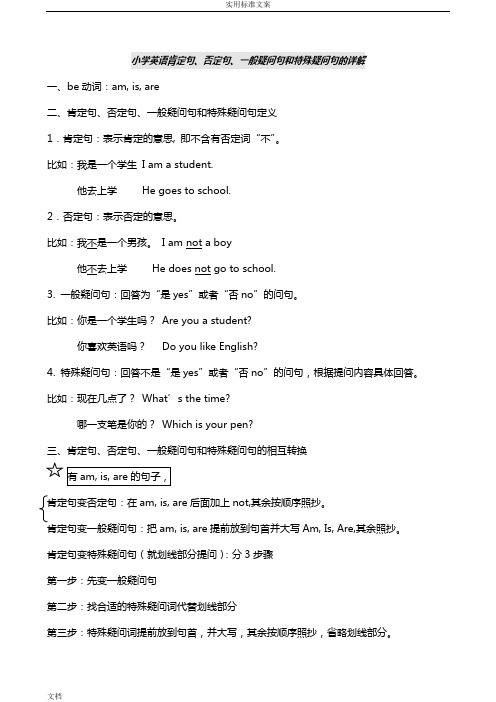
小学英语肯定句、否定句、一般疑问句和特殊疑问句的详解一、be动词:am, is, are二、肯定句、否定句、一般疑问句和特殊疑问句定义1.肯定句:表示肯定的意思, 即不含有否定词“不”。
比如:我是一个学生I am a student.他去上学He goes to school.2.否定句:表示否定的意思。
比如:我不是一个男孩。
I am not a boy他不去上学He does not go to school.3. 一般疑问句:回答为“是yes”或者“否no”的问句。
比如:你是一个学生吗?Are you a student?你喜欢英语吗?Do you like English?4. 特殊疑问句:回答不是“是yes”或者“否no”的问句,根据提问内容具体回答。
比如:现在几点了?What’s the time?哪一支笔是你的?Which is your pen?三、肯定句、否定句、一般疑问句和特殊疑问句的相互转换肯定句变否定句:在am, is, are后面加上not,其余按顺序照抄。
am, is, are提前放到句首并大写Am, Is, Are,其余照抄。
肯定句变特殊疑问句(就划线部分提问):分3步骤第一步:先变一般疑问句第二步:找合适的特殊疑问词代替划线部分第三步:特殊疑问词提前放到句首,并大写,其余按顺序照抄,省略划线部分。
注意:1.如:Li ming 's not here today. Who's not here today? 今天谁没来?2.划线部分不能在特殊疑问句中出现。
例如:1.肯定句、否定句和一般疑问句的互换肯定句:This is a book.否定句:一般疑问句:Is this a book?肯定回答:Yes, it is.否定回答:No, it isn’t.2.就划线部分提问(变特殊疑问句)This is a book.第一步:变一般疑问句Is this a book?第二步:找合适的特殊疑问词Is this what ?第三步:特殊疑问词提前放到句首,并大写,其余按顺序照抄,省略划线部分。
小学四年级英语(下册)一般疑问句特殊疑问句
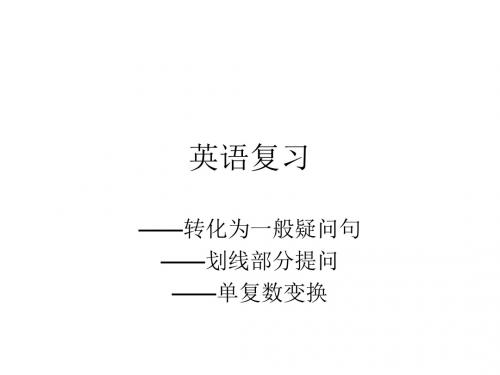
——转化为一般疑问句 ——划线部分提问 ——单复数变换
转化为一般疑问句
变一般疑问句的方法:(一调,二变,三问号)
一、当句中有Be(am,is,are)动词的时候,
1、将Be(am,is,are)提前,放于句首(大写);
2、将人称变换,
第一人称变第二人称(I→you,we→you,my→your,our→your),
can play basketball. →can play basketball. → Can play basketball?
can help you. →can help you. →Can help me?
can play football.
→can
play football.
→Can play football?
第三人称不变
3、在句尾加问号“?”
4、回答:
肯定: Yes , 主语+be.
否定: No, 主语+be+not.
am a teacher. →am a teacher. →am a teacher. →Are a teacher?
is a student.
→is
a student.
→Is a student?
1. how about you? 你呢?2.how about that shirt? 那件 衬衣怎么样?
1. where is my ruler? 我的尺子在哪里?2.where are you from? 你是哪里人?3. where are you going to ? 你打算去哪里?
How much 多少钱 用来问价格
play computer games yesterday . →Do play computer games yesterday . →Do play computer games yesterday?
四年级一般疑问句和特殊疑问句

一般疑问句和特殊疑问句【一般疑问句】一、什么是一般疑问句?答:能用yes / no(或相当于yes / no)回答的问句叫一般疑问句。
如何将陈述句变为一般疑问句1、第一家族:含be动词或情态动词的句子秘诀:一调二改三问号一调:即把句中的be或情态动词调到主语前;二改:改换主语称谓,即将句中的主语I\my \mines\we\our\ours等第一人称分别改为相应的第二人称you\your\ yours等;三问号:句末的句号改为问号。
如:. I am an English teacher. → Are you an English teacher?. We can speak English fluently. → Can you speak English fluently?2、第二家族:含行为动词(或称为实义动词)的句子秘诀:一加二改三问号一加:即在句首加助动词Do或Does;二改:1、把谓语动词改为原形;2、改换主语称谓(同第一家组);三问号:句末的句号改为问号。
. We read English every morning. → Do you read English every morning?. Tom’s father listens to English on the radio every evening. →Does Tom’s father listen to English on the radio every evening?特别注意:对于第二家族一定要注意动词的还原,因为时态与数的变化已经体现在助动词上了。
3、加强记忆口诀:“肯变一,并不难,can 或be提在前;谓语若为行为动,do 或does句首用。
”六、“some”还是“any”?在一般疑问句中,要表达“一些”时,一般用any,但如果这个问句是用来表达“建议、请求、邀请”等交际功能时,应该some.Is there any tea in the cup?. Do you have any children?. May I have some fish?Would you like some tea?Shall we buy some vegetables?Can I borrow some money from you?Why not have some bread?How about some orange juice?练练吧一、改为一般疑问句1. I can skate well. __________ __________skate well?2. Kate does morning exercises every day.________ Kate________ morning exercises every day?3. The exam begins at nine. __________ the exam__________ at nine?4. Ann returned the book to the library yesterday._______ Ann_______ the book to the library yesterday?5. There's something to eat in the cupboard.__________ there__________ to eat in the cupboard?6. Mary likes scuba diving very much._________ Mary_________ scuba diving very much?二、用 is, are, am ,do, did ,does ,can 填空,然后变成一般疑问句1. His father ____an English teacher.2. These children_____ crying.3. They______swim.4. ______ you like reading English? Yes, I like reading English.5. How _____you go to school? I go to school on foot.6. What _____he like? He likes English.7. _____ his father go to work by bus? No, his father rides a bike to work.8. ______ your father read newspaper last night? No, he read a story book.9.I ____ a teacher.一般疑问句10. He ____ a doctor.一般疑问句11.You _____ good workers.一般疑问句12.______ (它是) an apple.一般疑问句13.They _____ workers.一般疑问句14.I _____ three books.一般疑问句He ____ many trees.一般疑问句I can speak English.一般疑问句They can swim.一般疑问句Shall he call you tonight?陈述句I need finish my work.一般疑问句【特殊疑问句】特殊疑问句要由疑问代词或疑问副词开头,询问的内容不同, 使用的疑问词也不同。
- 1、下载文档前请自行甄别文档内容的完整性,平台不提供额外的编辑、内容补充、找答案等附加服务。
- 2、"仅部分预览"的文档,不可在线预览部分如存在完整性等问题,可反馈申请退款(可完整预览的文档不适用该条件!)。
- 3、如文档侵犯您的权益,请联系客服反馈,我们会尽快为您处理(人工客服工作时间:9:00-18:30)。
1. how are you? 你好吗?2. how is your mother? 你妈 妈好吗?
对划线部分提问之答题口诀 :
第一步,找出特殊词(what when how where who which whose等) 第二步,把原句变成一般疑问句 (划线 部分是主语或主语的定语除外)。 第三步,特殊词加上一般疑问句,划线部分
can play basketball. →can play basketball. → Can play basketball?
can help you. →can help you. →Can help me?
三、句中没有Be动词和情态动词can的时 候
1、在句首加Do或Does,当主语是第三人 称单数的时候用Does,其它都用Do 2、将人称变换,第一人称变第二人称 (I→you,we→you,my→your,our→your), 第三人称不变(一变二,二变一,三不变)
This is her dog. →is This her dog. →whose is This dog. →Whose is this dog?
My sister's trousers are black. →are My sister's trousers black. →what colour are My sister's trousers. →what colour are My sister's trousers?
They are good at singing. →are They good at singing. →what are They good at. →What are they good at?
放映结束 感谢各位批评指导!
谢 谢!
让我们共同进步
1.how much is this dress? 这个连衣裙多少钱?2.how much are these desks? 这些桌子多少钱?
who whose how
谁
用来问人物是谁
谁的 怎么样
用来问东西是谁的 用来询问身体等状况
1.who is that boy?那个男孩是谁?2. who are you ? 你是谁?3. Who is that pretty lady?那个漂亮的女士 是谁?
什么
用来问是什么,叫什么,做什么等
1. What’s your name? 你叫什么名字?2. What’s your father?你爸爸是干什么的?3. what is in your box? 你的盒子里是什么?4 what is weather like in Beijing?
What time 什么时间 用来问时间
1.How many apples do you have? 你有多少苹果? 2.How many students are there in your class ?你班有 多少学生?
1.how old are you? 你几岁?2. how old is your father? 你爸爸多大了?
She is in Grade Four. →is She in Grade Four. →what grade is She in. →What grade is she in?
They are Tom and Jane. →are They Tom and Jane. →who are They. →Who are the?
is a student.
→is
a ent.
→Is a student?
二、当句中没有Be动词, 有情态动词, 时候
1、将提前can,放于句首(大写); 2、将人称变换,第一人称变第二人称 (I→you,we→you,my→your,our→yo ur), 第三人称不变(一变二,二变一,三
1. how about you? 你呢?2.how about that shirt? 那件 衬衣怎么样?
1. where is my ruler? 我的尺子在哪里?2.where are you from? 你是哪里人?3. where are you going to ? 你打算去哪里?
How much 多少钱 用来问价格
play computer games everyday. →Do play computer games everyday. →Do play computer games everyday?
plays computer games everyday.
划线部分提问
疑问词
意义
用法
特殊疑问句例句
what
1.What time is it? 几点了?2.What time is it now? 现 在几点了?
What colour 什么颜色 用来问颜色
1.waht colour is your bag? 你的书包是什么颜色? 2.what colour is your book?你的书本是什么颜色?
英语复习
——转化为一般疑问句 ——划线部分提问 ——单复数变换
转化为一般疑问句
变一般疑问句的方法:(一调,二变, 三问号)
一、当句中有Be(am,is,are)动词的时候, 1、将Be(am,is,are)提前,放于句首(大 写); 2、将人称变换,
am a teacher. →am a teacher. →am a teacher. →Are a teacher?
What about 怎么样
How many 多少
How old 几岁 How about 怎么样
where
哪里
用来征求意见或询问感受等,大多用于承接上面的同样问题
用来问数量 用来问年龄 用法与what about相同 用来问地点
1.what bout this pair of shoes?这双鞋子怎么样? 2.what about you?你呢?3.what about your dad?你爸 爸呢?
